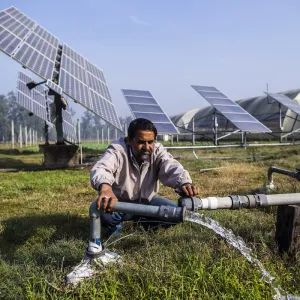Scaling up sustainable and inclusive solar irrigation in India
An evaluation of CGIAR’s work on ‘solar power as a remunerative crop’ finds that it has contributed to the adoption of a more inclusive and sustainable approach in major Indian government programs The dark side of the sun Solar-powered irrigation could be touted as a modern-day exemplar of hi-tech India, nestled within the larger narrative of the irrigation that propelled

Scaling up sustainable and inclusive solar irrigation in India
An evaluation of CGIAR’s work on ‘solar power as a remunerative crop’ finds that it has contributed to the adoption of a more inclusive and sustainable approach in major Indian government programs
The dark side of the sun
Solar-powered irrigation could be touted as a modern-day exemplar of hi-tech India, nestled within the larger narrative of the irrigation that propelled the Green Revolution. With groundwater now supplying 60% of irrigation across the country, the emergence of solar pumps is allowing farmers to draw water without using energy derived from coal-powered plants or diesel-powered pumps. However, there is a dark side to ‘sunshine farming’. Once installed, solar power is free – and this can exacerbate the ongoing depletion of scarce water resources, particularly in the drier north-western and peninsular regions of India.
How, then, to avoid unintended consequences while continuing to incentivize solar irrigation as part of a sustainable agricultural model? The idea of Solar Power as a Remunerative Crop (SPaRC), wherein farmers are encouraged to sell surplus solar power to the grid rather than over-pump groundwater, was developed as one such solution. The International Water Management Institute (IWMI), as part of its IWMI-Tata Water Policy Research Program (ITP), has been working on SPaRC since 2012, with support from the CGIAR Research Programs on Water, Land and Ecosystems (WLE) and Climate Change, Agriculture and Food Security (CCAFS).
—
Photo credit: Prashanth Vishwanathan/IWMI

